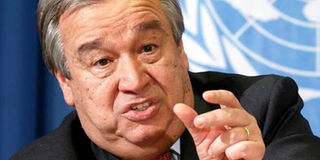New era dawns at the United Nations

Secretary General of the United Nations Antonio Manuel de Oliveira Guterres
On January 1, former Portuguese prime minister Antonio Manuel de Oliveira Guterres assumed office as the 9th secretary general of the United Nations. The new man on the 38th floor at UN headquarters, New York, was for 10 years the UN High Commissioner for Refugees based in Geneva, Switzerland.
Guterres, who is 67 years old, steps in the shoes of the lacklustre Ban Ki-moon of South Korea who was the UN’s top diplomat for 10 years during which he failed, in my opinion, to fill the shoes of his predecessor Kofi Annan who is one of best secretaries general of the world organisation.
Dag Hammarskjold of Sweden, who died under dubious and mysterious circumstances in September 1961 at Ndola, Zambia, and Kofi Annan of Ghana are the two most highly rated UN chiefs since the organisation was founded in 1945.
Who is Antonio Guterres?
Antonio Guterres, born April 30, 1949, is a Portuguese intellectual, politician and diplomat who was secretary general of Portugal’s Socialist Party from 1992-2002; prime minister of Portugal from 1995-2002; president of Socialist International from 1999-2005 and UN High Commissioner for Refugees from 2005-2010.
As boss of UNHCR, Guterres provided effective leadership to one of the largest humanitarian organisations in the world with more than 10,000 members of staff who provide assistance and protection in 126 countries for more than 60 million refugees, returnees, IDPs and stateless persons, including almost one million refugees here in Uganda.
Guterres is by profession an engineer who graduated in 1971 and began an academic career as an assistant professor of Systems Theory and Telecommunications Signals. He abandoned his academic career for politics in 1974 when he became a member of the Socialist Party, but the foundation of his political career was laid by a strong Christian faith.
Unlike many people who are ideologically socialists, Guterres is a practising Christian whose progressive Catholicism has informed his brand of social democratic politics.
During the heyday of the Portuguese revolution in the 1970s, he was an odd man out in the Socialist Party which was dominated by people who had Marxist background with no Christian roots. But Guterres rose through the ranks of the Socialist Party to become a modernising leader whose mission was social justice and equality.
The mission of the new UN chief
On his first day as United Nations secretary general, Antonio Guterres made a pledge to ensure 2017 is a year for peace which the world so badly needs. Soon after taking over the reins of power, Guterres said, “Let us make 2017 a year in which we all – citizens, governments, leaders – strive to overcome our differences. Let us resolve to put peace first.”
The new UN chief’s message is pertinent and timely for Uganda, DR Congo, Burundi, Kenya, South Sudan and needless to say all African countries. Africans must learn and strive to overcome their differences peacefully and honestly using political means, not the gun or intimidation or blackmail.
Guterres has already appointed a woman, Ms Amina Mohammed of Nigeria, as deputy UN secretary general, which is in line with his desire for and commitment to gender parity which he believes is important for the UN to thrive.
Another woman, Maria Luiza Viotti of Brazil, has been appointed chief of staff of the UN secretary general’s executive office. I am sure many more women will in due course be appointed to senior UN positions to reverse gender imbalance. In 2016, 33 out of 46 senior UN positions were held by men.
The new secretary general has announced that his priority at the UN will be what he calls a “surge in diplomacy for peace” and to achieve this objective he intends to promote a culture of prevention in which the UN will play the role of an honest broker, bridge-builder and messenger of peace and focus its resources on preventing crises instead of simply managing them after eruption.
For this plan to work, the UN will need to establish and build effective partnerships with regional organisations, such as the African Union, international financial institutions and the private sector.
Secretary general Guterres has assumed office during the same month as US president-elect Donald Trump whose preliminary views on the UN are hostile or sceptical at best. The new US president has expressed doubts about climate change and global warming, two issues about which the UN and the US administration of president Barack Obama have played leading and constructive roles.
The danger and fear that president Trump may reverse the gains made by the international community over the past two decades has convinced Guterres to seek an early appointment to meet the new US president to discuss matters of mutual concern between the UN and US which is the world organisation’s principal donor and historically a leader in the search for international peace and security.
Guterres has already met Russian president Vladimir Putin to discuss, inter alia, the situation in Syria and the Middle East.
Unlike Ban Ki-moon who practised what political scientists call “quiet diplomacy” behind closed doors, Guterres is not a quiet voice, but a forceful and outspoken leader on the international stage, like Kofi Annan.
After 10 years of largely ineffective diplomacy by a soft-spoken, timid and colourless secretary general, it is perhaps time for the UN to have as its leader a man who speaks the truth openly and confidently without fear or favour.
I wish Mr Guterres every success in the daunting task which lies ahead of him.
Mr Acemah is a political scientist, consultant and a retired career diplomat. [email protected]




